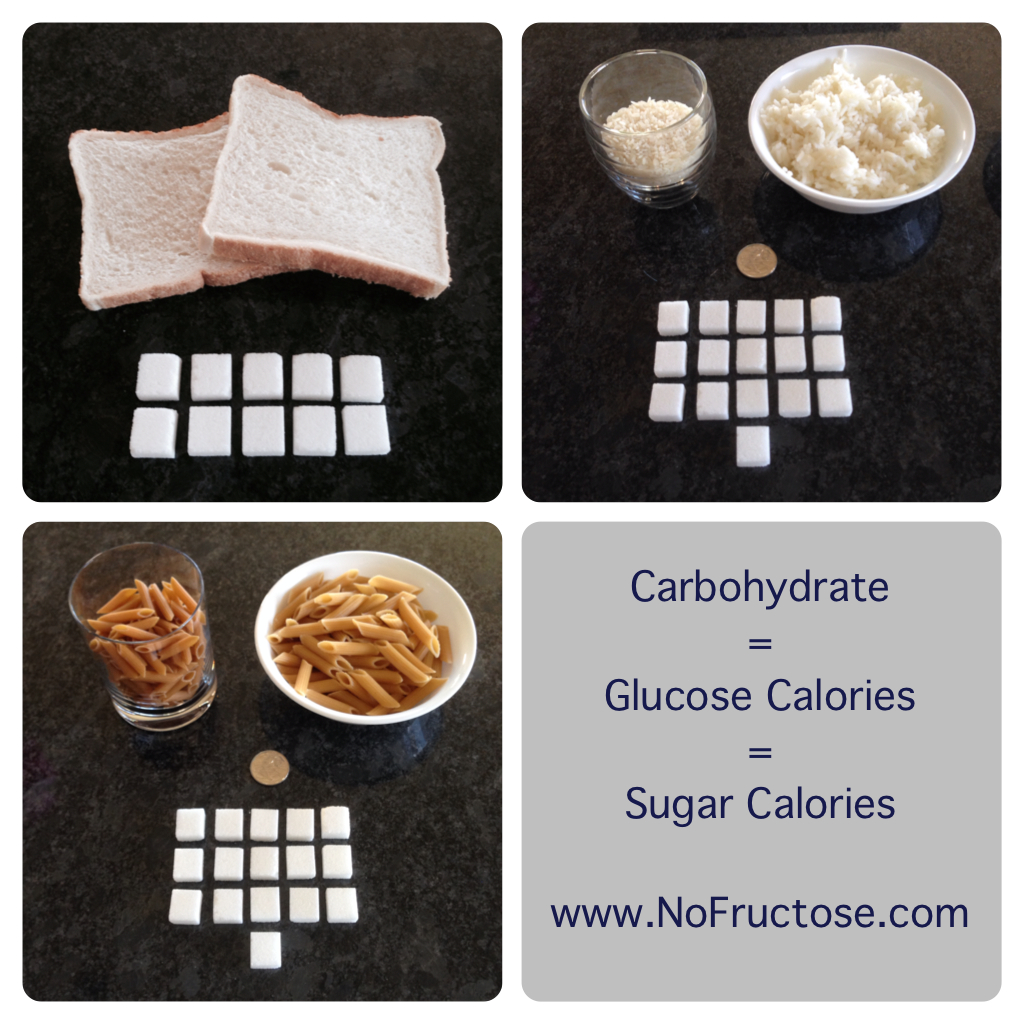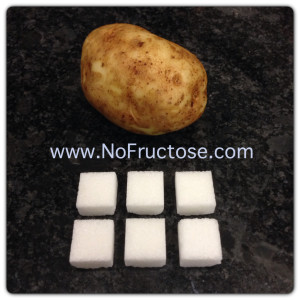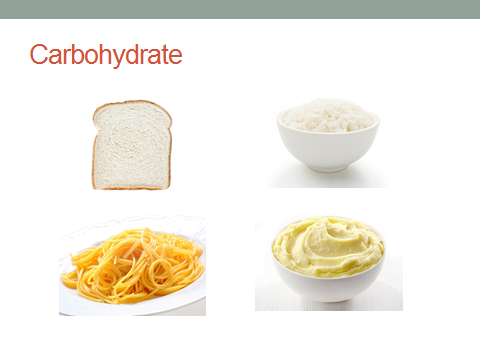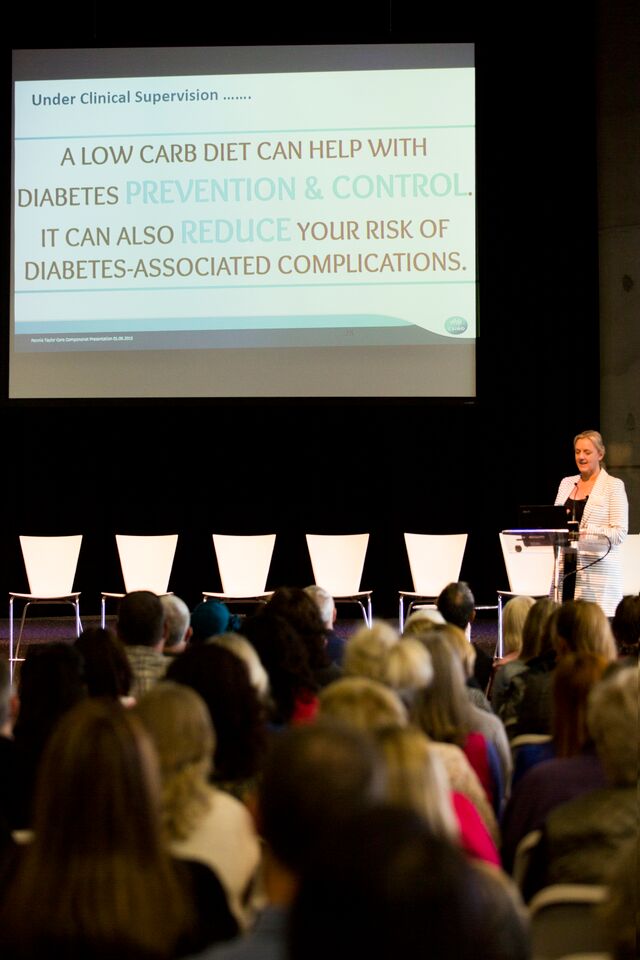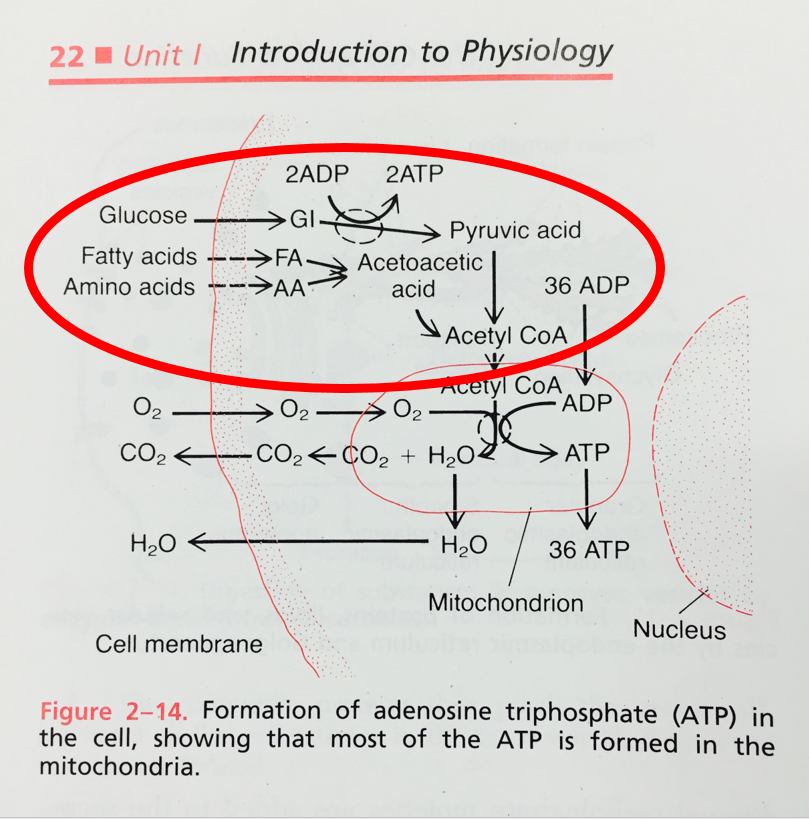BASICS
- Carbohydrate is essentially glucose.
- Excess intake provokes an insulin response and is stored as fat.
- Fibre with carbohydrate slows the absorption of glucose with a lower blood glucose spike and a lower insulin response.
- Refined carbohydrate in the form of bread, pasta and rice have very little or no fibre.
- Carbohydrate by itself is ‘boring’. The toppings make them interesting.
- It is a MYTH that we require 130 grams per day of carbohydrate in our diet.
The NoFructose Handout Starter Sheet is your take away summary of this web site. Read it at the NoFructose Starter Sheet area of this web site or download it.
IDEAS
Are Carbs the Problem?
There is a surprising amount of ‘energy’ in carbohydrate and if you are struggling with the weight control then look at the carb intake.
Carbohydrate commonly comes in the form of bread, rice and pasta. These have a lot of glucose in them.
Carbohydrate is essentially glucose and glucose is fuel. If you take in more than you require immediately then the excess is stored. The glycogen stores are replenished in the liver and the rest goes to fat storage.
One slice of bread, white or grain has about 5 teaspoons of glucose in it which is the same energy load as 5 teaspoons of sugar. That will have approximately the same effect on blood glucose as having a large scoop of ice cream.
100 grams of dry weight pasta or rice when cooked is about a bowl full. It has the equivalent of 16 teaspoons of glucose which is the same energy load as 16 teaspoons of sugar.
The digestion of carbohydrate starts with saliva in the mouth and continues through the intestine. It is rapidly broken down into glucose which is transported into the blood and then either metabolised or stored. High glucose levels provoke an insulin response which stimulates a fat storage response along with other effects.
Vegetables have varying amounts of carbohydrate in them and potato has a significant amount. The more colour to the vegetable, generally the less carb and the more fibre. Fibre is good as it slows up the absorption of the carbohydrate and results in less of a glucose spike in the blood stream.
Is it no wonder that farmers fatten up their stock by grain feeding them. We are fattening up society by grain feeding – a massive energy load in the form of carbohydrate which is just glucose.
What Do I Eat?
We rarely have bread by itself – we put butter on it.
We generally never have a bowl of pasta by itself – the sauce makes it palatable.
Rice by itself is boring – the meat and vegetable topping makes it palatable.
Try eating a Pizza base by itself. The texture and ‘crunch’ is alright for a bite but the good stuff is the topping.
I regularly get asked ‘What do I eat?
I eat all the good stuff. All the toppings, all the the meat, vegetables and sauces with their flavours, textures, colours and nutrition. These are the energy dense forms of food which are slowly converted to energy in the body without the insulin spike. They fill me up.
Carbohydrate is Boring
Look at the colour. Pale and bland and effectively glucose.
I see Carbs as a transport mechanism for getting the tasty and nutritional food from your plate into your mouth. Bread is a method of carrying food from your plate to your mouth. Same goes with pizza bases.
Most people traditionally have a bowl of pasta or rice and put a bit of topping or sauce on top of it to flavour it. Try just a small amount of carbohydrate and bury it in the topping. Better nutrition with energy dense food and you need to eat less to fill you up. All the taste with the health benefits.
Why have so much carbohydrate in our diet?
Carbs are cheap to produce and are fillers. They do satisfy your hunger but at the expense of a glucose load and insulin spike.
Looking for a carbohydrate substitute – look no further than cauliflower.100g of rice is a small bowl when cooked up. It contains between 16 and 20 teaspoons of glucose which is a massive glucose load on the body with a surge in blood glucose followed by an insulin spike. This is about the same number of calories as 16 to 20 teaspoons of sugar.Brown rice with fibre still has the same glucose load but with a slower ingestion.Rice just by itself is ‘boring’ and most of us add meat, vegetables and sauces to it to make it enjoyable.Get some cauliflower and use a cheese grater to make a fabulous substitute. The taste of the cauliflower, just like the rice, is lost in the topping.100g of cauliflower ‘Rice’ has ONLY 1/2 a teaspoon of glucose load for the same volume, texture and ‘mouth sensation’. It has fibre and in the raw form is high in other nutrients including Vitamin C and B-6.Most times we do not cook the cauliflower but you can steam it. Then it’s only a step away from being a ‘mashed potato’ substitute. I have been known to throw some fetta cheese in with it then.Enjoy – try something different.PS Preparation time – less than a minute!_____________________________Struggling with your weight?
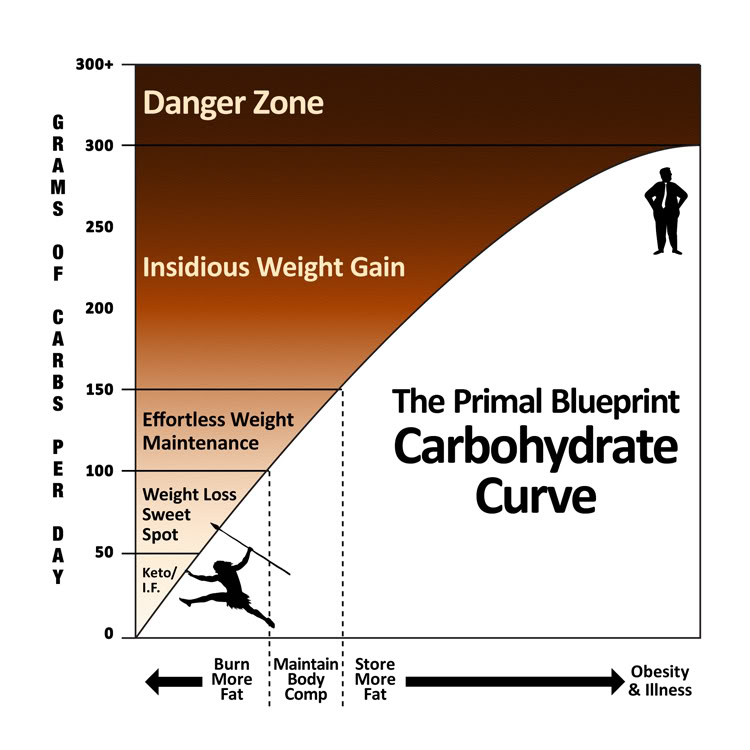 I think this is a fundamental image.Carbohydrate load is associated with weight gain and the reverse is possible. There are factors that tend to keep us maintaining our weight and that ‘level’ may need to reset.You don’t need to go into a ketogenic state to drop weight and that is not recommended acutely – it can feel awful in the first few weeks as your metabolism switches from a carbohydrate based one to a fat and protein based diet.
I think this is a fundamental image.Carbohydrate load is associated with weight gain and the reverse is possible. There are factors that tend to keep us maintaining our weight and that ‘level’ may need to reset.You don’t need to go into a ketogenic state to drop weight and that is not recommended acutely – it can feel awful in the first few weeks as your metabolism switches from a carbohydrate based one to a fat and protein based diet.
I have found that consciously bringing down the carbohydrate intake and maintaining that may help people to find their new ‘level’ of weight.
Remember to check with your doctor before considering a ketogenic option.
_______________________
The MYTH of requiring 130 grams of carbohydrate in the diet for the brain to function.
This is an outdated concept. We require far less carbohydrate in our diet because the liver will convert protein into glucose to adequately ‘run’ the brain. That’s how we survive in starvation.
http://diabetesupdate.blogspot.com.au/2008/11/myth-busting-your-brain-and-that.html
The brain will run very nicely on ketone bodies as the other fuel in hybrid engine bodies. There is a transition phase but brain function has been shown to improve on a Low Carb and High Fat diet.
http://www.ncbi.nlm.nih.gov/pmc/articles/PMC3116949/pdf/nihms246883.pdf
The only cell in the body that requires glucose exclusively is the red blood cell or erythrocyte. It will get that from the gluconeogenesis of glucose from protein when there is no carbohydrate in the diet.
http://www.med-ed.virginia.edu/courses/path/innes/nh/energy.cfm
Facebook blog 4/9/2014
__________________
CSIRO backs Low Carbohydrate management of Diabetes.
That’s it for the naysayers.
50 grams per day. That’s very low carb and with great results.
Pennie Taylor is a senior research dietitian at the CSIRO and we had the pleasure of hosting her on Saturday for the “Choose Health” forum attended by 250 plus participants.
Pennie presented the latest results of the CSIRO’s 2 year study of very low carb versus ‘traditional guideline’ high carb dietary management. Low carb gave significantly better results in blood glucose control and cardiovascular risk factors. The low carb participants had a significant reduction in their medication requirements.
The study results build upon exactly what I have been advocating for the last few years, based on international literature. We now have local confirmation from Australia’s peak research body.
The CSIRO work is solid and is now being expanded out into the next phase as a community trial. Our Dietitians and Diabetes Nurse Educator at the Nutrition for Life Centre had the opportunity to liaise on the mutual ground and we hope to do some collaborative work with her.
We had many health practitioners and influencers of our community there this time. These people will help inform more and more people that there is an option in diet and lifestyle. Lowering Carbohydrates is integral to that.
Low Carbohydrate management in Diabetes and other health conditions is a real option. Our hospital services have to reflect the current research and cannot continue to ignore it, let alone call it a fad diet. (7/9/2015)
http://ajcn.nutrition.org/…/…/07/29/ajcn.115.112581.abstract
http://ajcn.nutrition.org/…/02/ajcn.115.120675.full.pdf+html
___________________
MORE INFORMATION
Diabetes Management and Carbohydrate – Sugar Diabetes should be renamed ‘Carbohydrate’ Diabetes
Facebook Blog 14 August 2013
Please let all Diabetics know this basic fact. It will make a BIG difference.
It may be worth considering a Low and Complex Carbohydrate diet in the control of Type 1 and 2 Diabetes and in the avoidance of Type 2 Diabetes.
Most people think that Diabetes is a condition where the body has trouble controlling sugar and how it affects the blood sugar level. It is really about controlling carbohydrate!
Most people do not realise that sugar is just one form of carbohydrate and that all of the carbohydrate will affect blood glucose levels fairly rapidly. That is why the refined flours, breads, pasta, white rice, potatoes and other starches can cause a rapid rise in blood glucose and a spike in Insulin response.
These rapid responses and insulin spikes are probably accounting for the insulin resistance that is on the increase across the community. Our sugar intake is a huge part of this and the Fructose compounds the problem along a different pathway to the carbohydrate.
Most dietary advice for Diabetic patients is to maintain a regular amount of food coming in during the day and they encourage carbs in the form of breads, grains and fruit – all off that damn ‘food pyramid’. You are then encouraged to take medication and in particular Insulin to match your carbohydrate and sugar load. If you have more rapidly absorbed carbohydrate in your diet then you need more medication.
The problem of medical control in Diabetes is setting the level of medication to control the carbohydrate load. All Diabetic patients know to avoid high amounts of sugar unless they are having a hypoglycaemic event.
Most Diabetic patients are not taught to avoid a high carbohydrate load. This is an education issue.
It makes sense to cut the carbohydrate load way down and then you require less medication.
I have been encouraging patients down this path and seen some remarkable turn arounds in their overall Diabetic control.
I had one patient in hospital recently with poorly controlled Diabetes and we halved her Insulin requirement just by me taking her fruit bowl away.
This week’s Health Report on the ABC highlights one doctor’s personal journey and revelation of adopting a Low and Complex Carbohydrate diet in his Type 1 Diabetic management. It is just as relevant for all Diabetic and pre diabetic patients. I believe it is relevant for all of us.
http://www.abc.net.au/radionational/programs/healthreport/low-carbohydrate-diet-to-manage-diabetes/4880362#transcript
It is not a matter of just switching over to this, particularly if you have fragile control. Discuss it with your own doctor and do it over some weeks. Go to the Diabetes part of my website for relevant articles and more information
A bit more info.
At a tissue level our cells require glucose for their energy metabolism – not sugar or sucrose or carbohydrate or fat or protein. All of these substances can be turned into glucose by a variety of pathways. The carbohydrates do it faster in general.
The carbohydrates include glucose, sucrose and the starches. The simpler the carbohydrate the more rapid is the absorption across the gut wall and into the bloodstream. Grains and brown rice have more fibre within them and have a slower absorption profile across the gut. This means slower blood glucose level rises and less insulin spikes.
So if you want some carbohydrate go with the grains, brown rice, vegetables and particularly the green leafy ones.
_____________________
God’s interpretation of making the brain dependent on glucose.
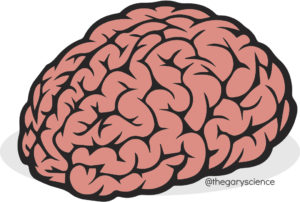 I am told over and over that the brain is dependent on glucose and its dangerous to run low carb. This is the primary concern of doctors, medical students, dietitians, midwives and most people, but not biochemists.
I am told over and over that the brain is dependent on glucose and its dangerous to run low carb. This is the primary concern of doctors, medical students, dietitians, midwives and most people, but not biochemists.
Let’s explore some religion to break a myth.
Is God (in whatever form that is) stupid enough to make our most important organ, the brain, dependent on only one fuel source of glucose? Surely not.
On my recent trip to Vanuatu I was looking through a 1996 textbook of physiology. There it all was on page 22 of a 1148 page textbook – in the Introduction to Physiology chapter. We are not even in the ‘fine print’ area!
Here’s some basic biochemistry, and it’s not even new.
The mitochondria is the engine of the cell. It will process a variety of fuel sources into Acetyl-CoA which then enters the Krebs cycle and converts into ATP – Adenosine Tri phosphate. ATP is found in all living tissue and provides energy for virtually all physiological processes. We are completely dependent on that ATP – it is life itself.
That mitochondria is like a teenager looking for food. It doesn’t care where the Acetyl CoA comes from, as long as it’s there.
Acetyl-CoA can be made from glucose from carbohydrate, ketone bodies (fatty acids) from fat and amino acids from protein. The mitochondria is a hybrid engine and it will run efficiently on these different fuel sources.
Any cell that has mitochondrion will need Acetyl-CoA. Every cell in the brain has mitochondria. Every cell. As a result every brain cell can run along on ketones and low carb. That’s what happens if you skip a meal, fast overnight or longer. It’s all just perfectly designed to keep our brains functioning.
There are only 2 cells in the body that are dependent on glucose. They don’t have mitochondria and they do require glucose. Have a think about that….and it’s not the brain. That glucose can be formed from a low carb diet or the liver by gluconeogenesis conversion of protein to glucose.
The myth of 140 grams of carbohydrate required per day is just another myth. There is no absolute requirement for ingested carbohydrate and I cannot find any evidence from where that ‘magical’ or ‘imaginary’ figure of 140 grams has come from. I have been told that it was estimated at a conference once and has become urban folklore!
The only cells that are dependent fully on circulating (not ingested) glucose are the erythrocytes (red blood cells) and some cells in the kidney (thin cells of the loop of Henle). Both of these cells lack mitochondria. No mitochondria means no hybrid engine. These two cells are uniquely dependent on glucose but get plenty of fuel from the glucose that the liver produces every day.
So when the next person says that the brain is dependent on glucose there is only one response…..
Do you really think God was stupid enough to make the brain, our most important organ to be dependent on one fuel source?
And certainly not on just glucose.
ARTICLES
Four grams of glucose
Four grams of glucose circulates in the blood of a person weighing 70 kg. This glucose is critical for normal function in many cell types. In accordance with the importance of these 4 g of glucose, a sophisticated control system is in place to maintain blood glucose constant. Our focus has been on the mechanisms by which the flux of glucose from liver to blood and from blood to skeletal muscle is regulated. The body has a remarkable capacity to satisfy the nutritional need for glucose, while still maintaining blood glucose homeostasis. The essential role of glucagon and insulin and the importance of distributed control of glucose fluxes are highlighted in this review. With regard to the latter, studies are presented that show how regulation of muscle glucose uptake is regulated by glucose delivery to muscle, glucose transport into muscle, and glucose phosphorylation within muscle.
_______________
The low-carbohydrate diet and cardiovascular risk factors: Evidence from epidemiologic studies.
Abstract
AIMS:
Obesity is an important public health issue because of its high prevalence and concomitant increase in risk of cardiovascular diseases. Low carbohydrate diets are popular for weight loss and weight management but are not recommended in leading guidelines due to the perception that increases in dietary fat intake may lead to an adverse cardiovascular risk profile. To clarify the effects of a low-carbohydrate diet for weight loss on cardiovascular disease risk factors as compared to a low fat diet for weight loss, we systematically reviewed data from randomized controlled clinical trials and large observational studies.
DATA SYNTHESIS:
We searched the MEDLINE database (Jan 1966-Nov 2013) to identify studies that examined a low-carbohydrate diet as compared to a low-fat diet for weight loss or the improvement of cardiovascular disease risk factors.
CONCLUSIONS:
Recent randomized controlled trials document that low-carbohydrate diets not only decrease body weight but also improve cardiovascular risk factors. In light of this evidence from randomized controlled trials, dietary guidelines should be re-visited advocating a healthy low carbohydrate dietary pattern as an alternative dietary strategy for the prevention of obesity and cardiovascular disease risk factors.
_______________________
Resistant Starch
http://chriskresser.com/how-resistant-starch-will-help-to-make-you-healthier-and-thinner/
